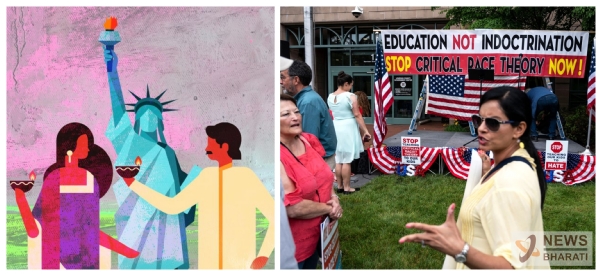And then they came for the Hindus
15 Jul 2022 16:58:01
The critical race theory movement that started by canceling George Washington and Thomas Jefferson and then shifted to attacks on Jewish supporters of Israel has quietly adopted a new and unlikely target for castigation: Hindu-Americans. From elite American universities and to left-wing controlled state and local governments, activists are waging a campaign to smear the nation’s fourth-largest religion and stigmatize its practice. While this kind of hatred against Hindus isn’t new, it’s time for political, civic and business leaders to speak out against it.

The status of Hinduism in America hasn’t changed much since the religion was blamed for driving Mrs. Sara Chapman Bull insane more than a century ago. Mrs. Bull was a writer and a philanthropist who became a lifelong sponsor and financial supporter of Swami Vivekananda, a highly revered Hindu monk and philosopher. Mrs. Bull bequeathed her entire estate to Vivekananda’s organization, the Vedanta Society. The two had developed a close friendship with the monk calling Mrs. Bull Dhira Mata or the Calm mother.
But, when Mrs. Bull died in 1911, her daughter, Olea Bull Vaughan, challenged her will in court, arguing that Hindus had driven Mrs. Bull insane. It was a devastating display of hatred towards Hindu practices. The petition stated that the “testator’s brain had been inoculated with the bacteria of faith taught by Indian Swamis.” The evidence: Mrs. Bull burnt incense and meditated. The court ruled against the Hindu monk and reverse Mrs. Bull’s will. As Boston University religion professor Stephen Prothero puts it, “Hinduism went on trial in the United States of America.” Unfortunately, Hindus and Hinduism still face the Hinduphobia that formed the basis of the 1911 trial.
The irony of course is that the concept of “caste” is not native to Hinduism or Asia, let alone India. It is a word of Iberian descent, a system imposed by colonialists originally to distinguish “older Christians” from “newer converts.” Discrimination against new converts would be justified as an attempt to maintain lineage, or Casta. Indeed, the concepts of caste society, or Societa de Castas, and blood purity were imposed on Hindu society by Portuguese colonizers to divide a Hindu society built on egalitarian social structures. History and facts matter little, it seems, to the critical race theory movement. The entire movement against caste appears to rest on one shoddy survey conducted by Equality Labs, a far-left social organization, which took unverified reports of discrimination from 1,500 anonymous respondents to represent the facts of life for 5 million Hindu Americans. The Equality Labs report inexplicably defames Hindu society and misrepresents the true nature of structures in Hindu society. And it has now become the foundational publication cited by those pushing for anti-Hindu policies in governments, universities and corporations.
Further, the now infamous suit brought forward by California Department of Fair Employment and Housing (DFEH) against Cisco alleging that the company’s managers who belong to a higher caste had discriminated against the complainant who belongs to a lower caste and that the Dalit Indian employee (an alumni of the prestigious Indian Institute of Technology) is darker complexioned than his higher caste managers. This utterly flawed premise of discrimination completely fails to explain the dark Brahmin found amongst the Hindus. But unfortunately, this too has become a landmark case in the burgeoning debate of caste discrimination. Academic institutions like Harvard University, Brandeis University (the first University to make caste a part of its non-discrimination policy), University of California (Davis), California State University amongst many others have also recognized caste discrimination based on the Equality Labs report. Ironically, considering the consistent negative criticism meted out to the Hindu society, it has been the most successful diaspora around the world. They tend to assimilate well in their host countries, they are successful entrepreneurs and professionals. They are generous and give back to the societies that they are welcomed by. For instance, Hindu Faith based non- profit organisation Sewa International’s response to Covid- 19 translated to $15 million in food, PPE kits, medical supplies and groceries being served in lower income and vulnerable communities. Over 5000 volunteers were engaged, and this was just in the United States. Their Covid relief extended to Pakistan, Bangladesh, Trinidad amongst a host of other countries in need, irrespective of race, gender, religion or nationality. But the chances of this being spoken of or used by the Hindu diaspora to defend themselves and their egalitarian approach to life would be a rarity. The issue lies with the complacency of the Hindus to protect themselves, prevent their identity from being attacked and leverage their strengths. It’s been a long-standing deficit.
Present non-discrimination policy can address the issue of caste discrimination if at all a case comes up, but to single out Hindus, to make them targets is in itself discriminatory. History has a way of repeating itself. Hinduism is going on trial once again.
